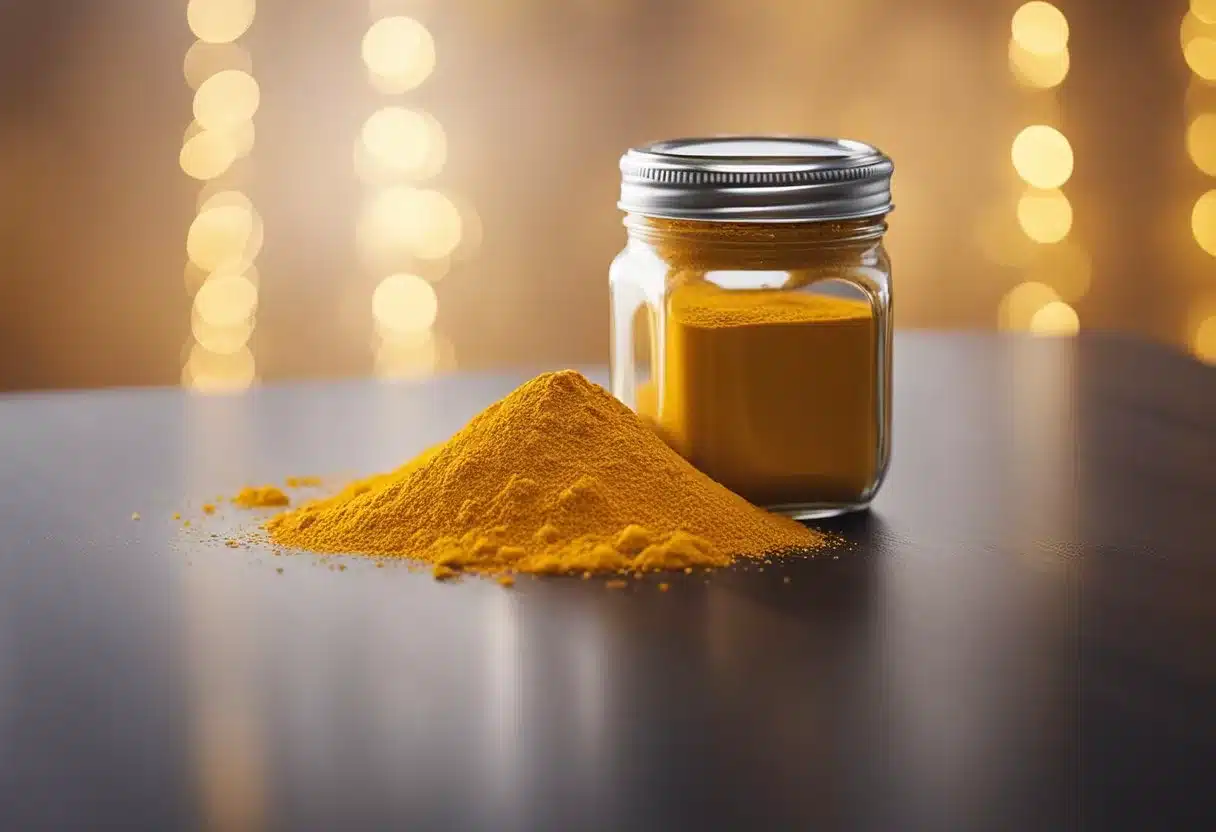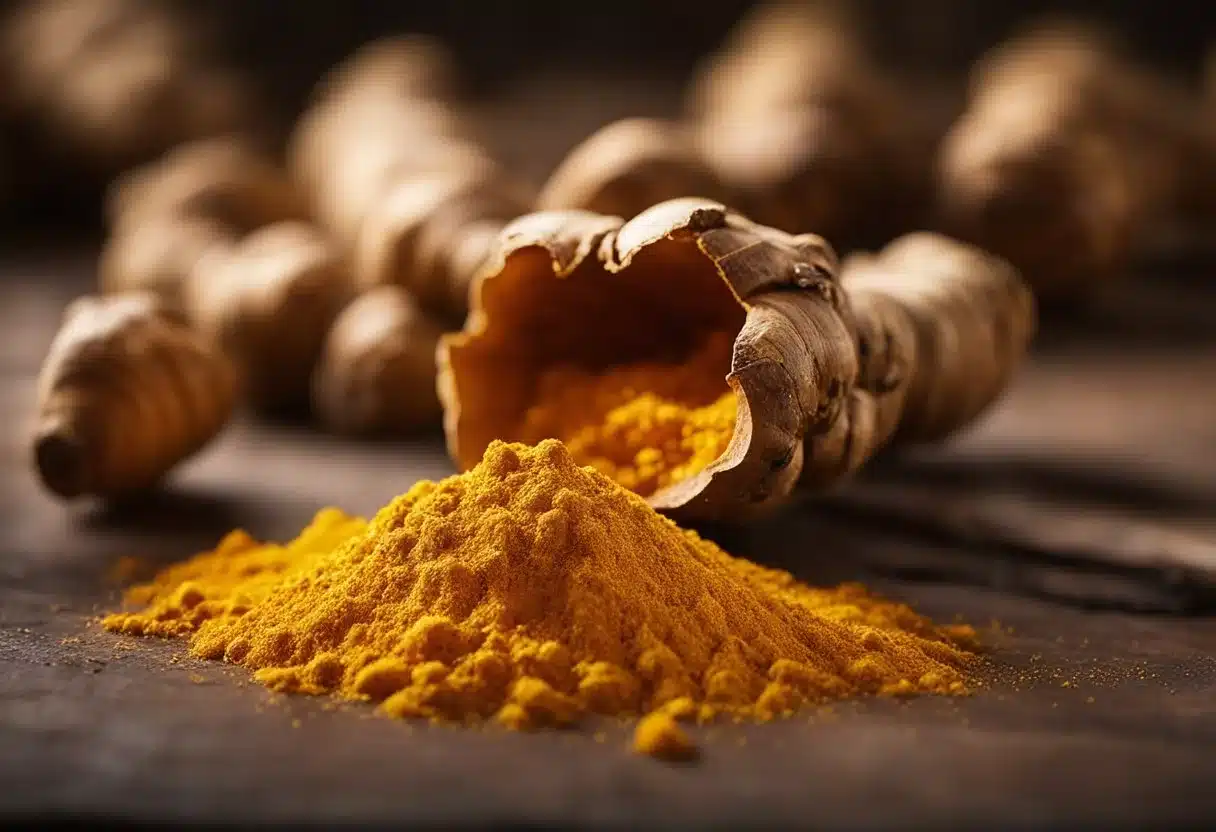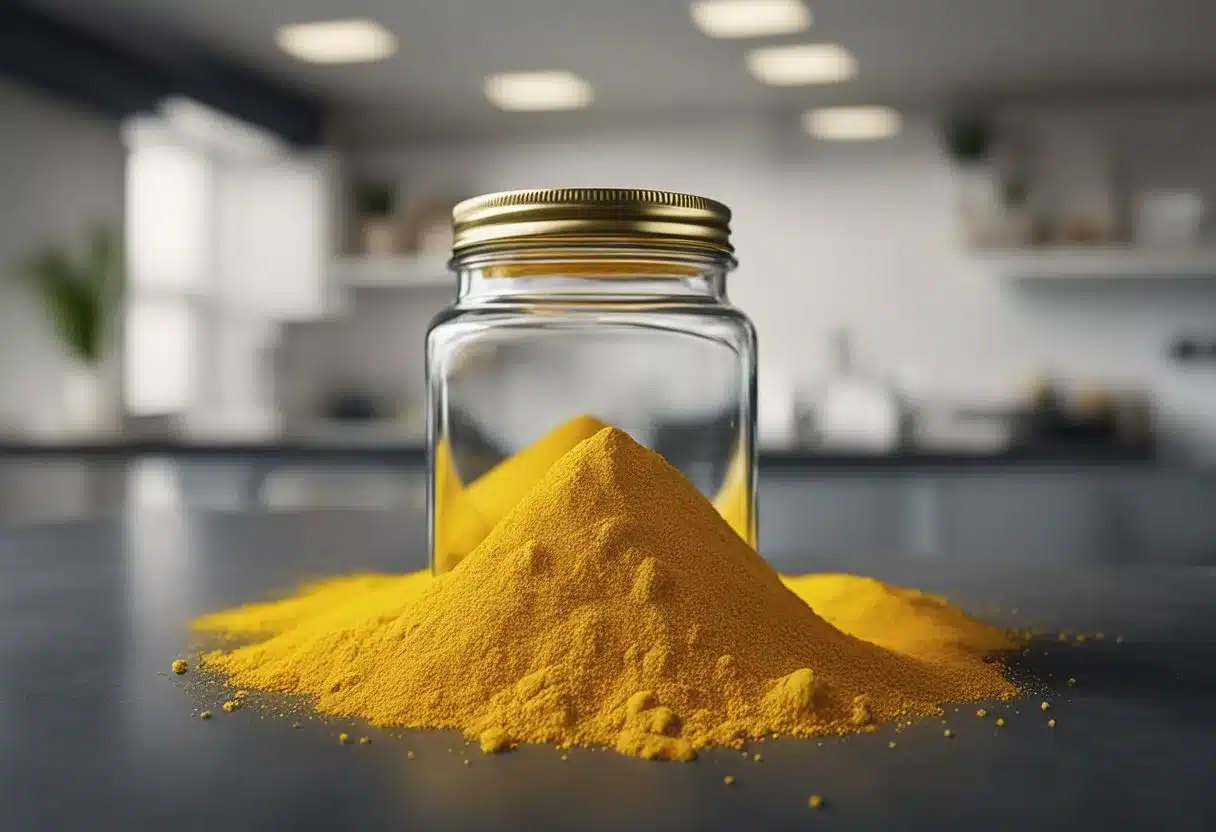Taking turmeric every day can have some surprising effects on your body. Turmeric, a vibrant yellow spice, has been used for centuries in traditional medicine. One of the most significant benefits is its potential to reduce inflammation and pain. This is largely due to curcumin, the active ingredient in turmeric, which has potent anti-inflammatory properties.

By incorporating turmeric into your daily routine, you might also be enhancing your brain health. Curcumin has been studied for its ability to improve memory and potentially reduce the risk of developing Alzheimer’s disease. Additionally, turmeric may support your heart health by lowering the risk of heart disease and helping maintain healthy cholesterol levels.
However, it’s important to use turmeric wisely. While it can be incredibly beneficial, taking too much can lead to side effects such as digestive issues. Consulting with a healthcare professional before starting any new supplement is always a good idea to ensure it’s safe for your individual health needs.
Key Takeaways
- Daily turmeric intake can reduce inflammation and pain.
- Curcumin in turmeric supports brain and heart health.
- Consult a healthcare provider before starting turmeric supplements.
The Basics of Turmeric

Turmeric is a spice that is not only flavorful but also known for its health benefits. Key compounds in turmeric, like curcumin, offer a range of potential benefits, and it’s important to understand how turmeric fits into the diet and how it differs from similar plants like ginger.
Understanding Turmeric and Curcumin
Turmeric is derived from the root of the Curcuma longa plant. It’s commonly used in cooking and as a medicinal herb. The primary active compound in turmeric is curcumin, which is responsible for many of its health benefits. Curcumin has anti-inflammatory and antioxidant properties, making it important for reducing inflammation and fighting free radicals in the body.
The concentration of curcumin in turmeric is not very high, usually around 3% by weight. Therefore, many people choose to use turmeric extracts or supplements to get a higher dose. These extracts often have a much higher concentration of curcumin than the spice used in cooking.
Turmeric in the Diet
Turmeric can be easily incorporated into daily meals. It’s commonly used in dishes like curries, soups, and rice. Even a small amount can provide a significant flavor boost and potential health benefits. Besides cooking, turmeric can be consumed as a tea or added to foods in powdered form.
For those who prefer not to cook with turmeric, supplements are available. These often contain higher concentrations of curcumin, making it easier to consume the amount needed for therapeutic effects. It’s best to pair turmeric with black pepper or fats, as these can enhance curcumin absorption in the body.
Differences Between Turmeric and Ginger
Turmeric and ginger are often confused due to their similar appearance and origin. Both are rhizomes, which are underground plant stems. However, they have distinct flavors and uses. Turmeric is typically bright yellow-orange and has a warm, bitter taste, while ginger is pale yellow and has a spicy, slightly sweet flavor.
Nutritionally, both plants offer health benefits but differ in their primary compounds. Ginger contains gingerol, which has its own anti-inflammatory and antioxidant properties. Turmeric’s main compound is curcumin. Both spices are used in cooking and traditional medicine but serve different roles in recipes and health practices.
Health Benefits of Turmeric

Turmeric offers numerous health benefits, thanks to its active compound, curcumin. It helps in reducing inflammation, alleviating arthritis symptoms, lowering cancer risks, improving heart health, and boosting cognitive function.
Anti-inflammatory Effects
Turmeric contains curcumin, which has powerful anti-inflammatory effects. Chronic inflammation is linked to many serious health conditions like heart disease and cancer. Turmeric can help reduce these risks by blocking molecules that play a role in inflammation. Regular intake can significantly reduce inflammation levels in the body, contributing to overall better health.
Reduction in Arthritis Symptoms
One of the most notable benefits of turmeric is its ability to reduce arthritis symptoms. Arthritis is mainly caused by inflammation in the joints, and turmeric’s anti-inflammatory properties can help ease the pain and stiffness associated with this condition. Studies have shown that curcumin can be as effective as some anti-inflammatory drugs, providing relief without the side effects.
Potential in Cancer Treatment
Turmeric may also play a role in cancer treatment and prevention. Curcumin has been studied for its ability to stop the growth and spread of cancer cells. It may reduce the risk of various types of cancer, including colon, breast, prostate, and lung cancer. This makes turmeric a valuable addition to a diet focused on reducing cancer risks.
Turmeric and Heart Health
Turmeric benefits heart health by improving the function of the lining of blood vessels, known as the endothelium. It helps regulate blood pressure and clotting, reducing the risk of heart disease. The anti-inflammatory and antioxidant properties of curcumin can also lower cholesterol levels. Regular consumption of turmeric can thus contribute to maintaining a healthy heart.
Cognitive and Mental Benefits
Besides physical health, turmeric positively affects cognitive and mental health. It may reduce the risk of conditions like dementia and Alzheimer’s disease by clearing amyloid plaques in the brain. Additionally, turmeric can boost mood and relieve symptoms of depression by increasing levels of brain-derived neurotrophic factor (BDNF) and serotonin. These cognitive benefits make turmeric a powerful spice for maintaining mental well-being.
Turmeric in The Medicine Cabinet

Turmeric, especially its active ingredient curcumin, has gained popularity for daily supplementation and potential interactions with medications. It’s essential to understand both its benefits and precautions.
Daily Supplementation
Adding turmeric supplements to your daily routine might offer health benefits. The active compound, curcumin, is known for its anti-inflammatory and antioxidant properties. Studies suggest taking 500-2,000 mg of turmeric per day, often in the form of an extract for better absorption.
Integrating turmeric in your diet can support liver function and reduce inflammation. It may also help ease pain and possibly lower the risk of certain cancers like colon and breast cancer. Adding turmeric to meals or taking it as a supplement can be a simple way to enhance overall health and well-being.
Interactions with Medications
However, it’s crucial to be aware of potential interactions with medications. Turmeric can affect how some drugs work in the body. For example, it may interfere with blood thinners and medications for diabetes, possibly leading to adverse effects. Additionally, turmeric might interact with antidepressants by affecting serotonin and dopamine levels, impacting mood regulation.
People taking medications should consult a healthcare provider before starting turmeric supplementation. These interactions can lead to reduced effectiveness of medications or increase the risk of side effects, making professional guidance essential for safe use.
Nutrition and Absorption

Turmeric’s health benefits are influenced by how well it’s absorbed by the body. Combining it with other foods can enhance its effects and ensure you get the most out of its nutrients.
Enhancing Bioavailability
Turmeric contains curcumin, a compound responsible for many of its health benefits. Curcumin is not easily absorbed by the body on its own.
Adding black pepper to turmeric can significantly improve absorption. Black pepper contains piperine, an active compound that can increase the bioavailability of curcumin by up to 2000%.
Including turmeric in a diet with fat can also enhance absorption. Curcumin is fat-soluble, which means it dissolves in fat. Cooking turmeric with oil or adding it to fatty foods can help curcumin be better absorbed by the body.
Combining with Other Foods
Eating turmeric with certain foods can enhance its nutritional benefits. Curcumin’s absorption improves when consumed with black pepper. Therefore, incorporating turmeric into recipes with black pepper ensures more curcumin enters the bloodstream.
Combining turmeric with healthy fats like coconut oil, olive oil, or avocados can further optimize absorption. This is because curcumin binds to fat, increasing its availability to the body.
Diet plays a crucial role in how well turmeric is absorbed. Including it in various dishes, such as curries, soups, or smoothies, alongside fat-rich foods can maximize its benefits.
By understanding these combinations, one can ensure they are getting the most out of turmeric daily.
Side Effects and Precautions

When taken daily, turmeric can offer potential health benefits, but it’s important to be aware of side effects and specific precautions.
Common Side Effects
Consuming turmeric can sometimes lead to nausea, upset stomach, and diarrhea. These symptoms often occur when ingesting high doses. Bloating may also be a problem for some people. If you experience these side effects, it’s wise to reduce the amount you take or stop altogether until the symptoms subside.
Some individuals may also experience dizziness or headaches. It’s important to monitor your body’s reactions when introducing any new supplement. Always start with a small dose and gradually increase to prevent adverse reactions.
Special Considerations for Certain Health Conditions
Turmeric may not be suitable for individuals with specific health conditions. People with bleeding disorders should be cautious as it can slow blood clotting, increasing the risk of bleeding and bruising. Similarly, those on blood-thinning medication should consult a healthcare provider before taking turmeric.
For pregnant women, it’s best to avoid high doses of turmeric due to the potential for uterine contractions. People with gallbladder issues, such as gallstones or bile duct obstructions, should also be cautious as turmeric can exacerbate these conditions.
Concerns with Heavy Metal Content
Another consideration is the potential for heavy metal contamination. Some turmeric supplements have been found to contain trace amounts of lead and other heavy metals. To avoid this, it’s important to purchase turmeric and supplements from reputable sources that have been tested for purity.
Regular consumption of contaminated turmeric can lead to lead poisoning, which is particularly harmful and can affect the nervous system. Always check labels and verify the quality of the product before making a purchase.
By being aware of these side effects and precautions, you can safely incorporate turmeric into your daily routine while minimizing potential risks.
Practical Uses and Recipes

Turmeric can be a versatile addition to your daily routine, enhancing both flavor and health benefits. It’s often used in cooking and can also be enjoyed in beverages.
Incorporating Turmeric into Meals
Turmeric is a staple in many culinary traditions. It adds a warm, earthy flavor and a bright yellow color to dishes. One common use is in curry powder, a blend of spices.
For an easy way to incorporate turmeric into your meals, consider adding it to soups, stews, and stir-fries. You can also sprinkle it over roasted vegetables or mix it into scrambled eggs.
Including turmeric in recipes for rice or quinoa can elevate your side dishes. Just a teaspoon of turmeric can turn a simple dish into something special.
Turmeric can also be used to marinate meats and tofu, adding both color and flavor. Combine turmeric with garlic, ginger, and a splash of lemon juice for a flavorful marinade.
Making Turmeric Tea and Other Beverages
Turmeric tea is a popular way to enjoy the benefits of this spice. Known for its anti-inflammatory properties, turmeric tea is easy to make.
To prepare turmeric tea, mix a teaspoon of turmeric powder with hot water and a squeeze of lemon. Adding honey can enhance the flavor while providing additional health benefits.
Golden milk is another delightful beverage. Combine turmeric, milk (or a milk substitute), a pinch of black pepper, and a bit of honey. Heat the mixture to just below boiling and enjoy this soothing drink.
Turmeric can also be added to smoothies for a nutritional boost. Blend turmeric with your favorite fruits, vegetables, and a liquid base like almond milk or orange juice.
For a refreshing twist, try turmeric lemonade. Mix turmeric powder with lemon juice, water, and a touch of sweetener for a vibrant, healthful drink.
Research, Evidence, and Clinical Trials

Turmeric has been the subject of numerous clinical trials, revealing potential benefits for chronic diseases and mental health. This section explores the specifics of these findings.
Studying Turmeric’s Effects on Chronic Diseases
Turmeric is often studied for its impact on chronic diseases. In particular, research has focused on conditions such as rheumatoid arthritis, type 2 diabetes, and inflammatory bowel disease. One study found that curcumin, the active component in turmeric, may help reduce symptoms in rheumatoid arthritis patients when taken in doses of 1,000 mg daily.
Clinical trials have shown promising results for other conditions. Curcumin has demonstrated potential in reducing blood sugar levels in type 2 diabetes patients. Additionally, turmeric’s anti-inflammatory properties may help alleviate symptoms associated with inflammatory bowel disease.
Recent studies have also explored turmeric’s role in cancer prevention. Some trials suggested that high doses of curcumin could reduce the progression of pre-cancerous lesions.
Turmeric’s Role in Mental Health and Neurology
Evidence has also emerged on turmeric’s effects in mental health and neurology. One area of particular interest is its potential impact on major depressive disorder. Research indicates that curcumin may boost levels of brain-derived neurotrophic factor (BDNF), which is linked to reduced symptoms of depression.
Studies have looked at turmeric’s influence on Alzheimer’s disease. Some trials suggested that curcumin could help in reducing amyloid plaques, which are associated with Alzheimer’s.
Additionally, turmeric’s antioxidant properties may offer neuroprotective effects, potentially benefiting conditions like depression and stress. For example, a clinical trial involving curcumin showed reduced symptoms in patients with major depressive disorder when taken alongside antidepressants.
These studies highlight turmeric’s potential role in improving both physical and mental well-being, offering a natural supplement for managing various chronic and neurological conditions.
Frequently Asked Questions

Daily turmeric consumption can have various effects, ranging from potential side effects to specific health benefits. It is important to know both the recommended dosage and the best time of day to take turmeric.
What are the potential side effects of consuming turmeric daily?
Some people may experience stomach pain, nausea, or diarrhea when consuming turmeric every day. High doses can lead to more severe side effects like dizziness or headaches. Those with certain medical conditions should be cautious.
Can daily intake of turmeric offer benefits for women specifically?
Turmeric may help reduce menstrual pain and improve mood swings. It has anti-inflammatory properties that can alleviate symptoms of conditions like endometriosis and PMS. Its antioxidant properties also support overall skin health.
Are there any specific conditions that make turmeric consumption inadvisable?
Individuals with gallbladder problems or kidney stones should avoid turmeric. It may also interact with certain medications such as blood thinners. Pregnant women should consult their doctors before taking turmeric supplements.
How much turmeric is considered safe to consume each day?
Studies suggest that doses between 500-2,000 mg per day are typically safe. Most of these doses involve turmeric extracts with high curcumin concentration. It is advisable to start with a lower dose and gradually increase it.
What is the best time of day to take turmeric to reduce inflammation?
Turmeric can be taken at any time of the day. However, some experts recommend taking it with meals to improve its absorption and reduce the risk of stomach upset. Combining it with black pepper enhances its absorption.
Can regular consumption of turmeric contribute to weight loss, particularly in burning belly fat?
Turmeric may aid in weight loss by reducing inflammation and improving metabolism. It also helps in regulating blood sugar levels. While it may not specifically target belly fat, it can support overall weight loss efforts.